Physical Address
304 North Cardinal St.
Dorchester Center, MA 02124
Physical Address
304 North Cardinal St.
Dorchester Center, MA 02124
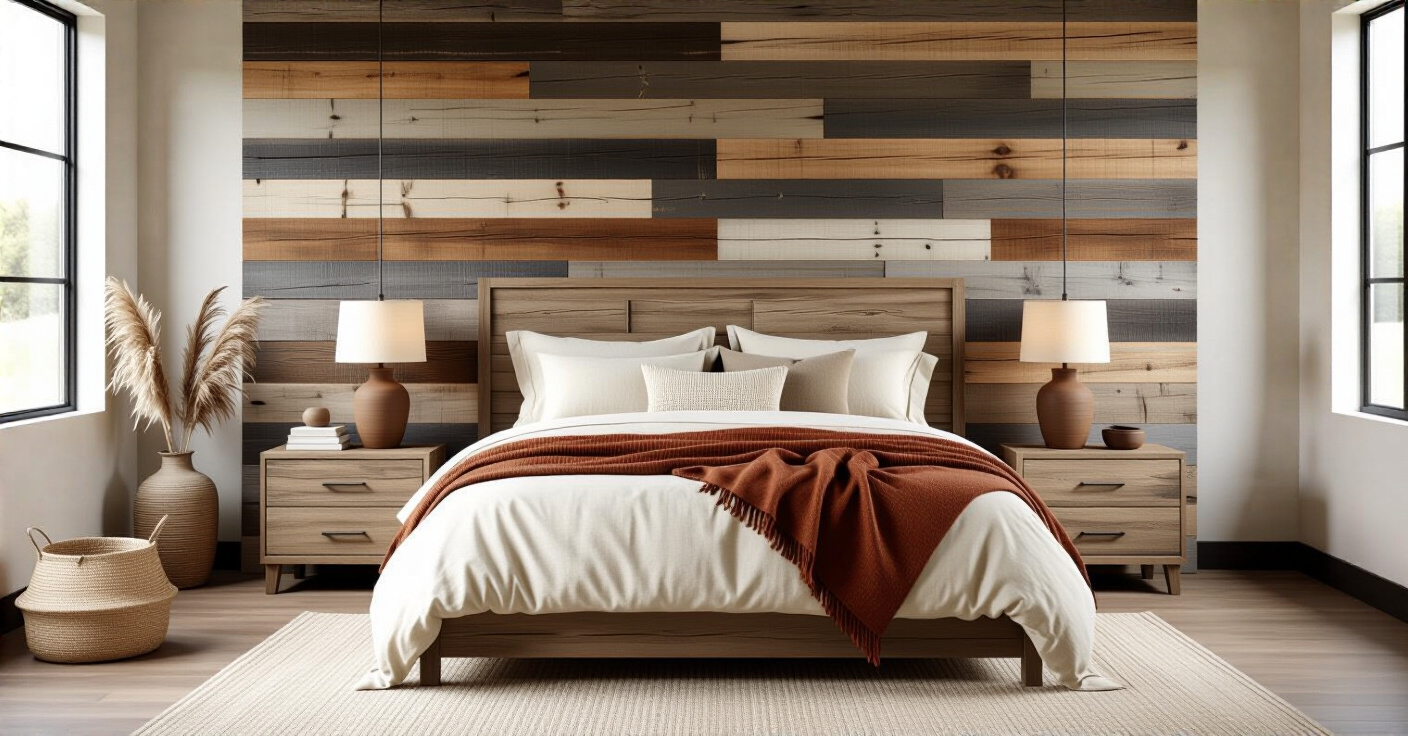
Create a warm, rustic bedroom sanctuary with 22 ideas on natural materials, cozy textiles, and warm light. A guide to authentic, soulful design.
You know what people always ask me about rustic design? They see these images online or on television—endless shiplap, tin signs that say “Farmhouse,” and furniture that looks like it was beaten with chains in a factory. They ask, “Is that really it?”
And I tell them, no. That is not it. That is a theme park version of a life. Real rustic living, the kind we understand in the Nordics, isn’t a collection of manufactured props. It is a feeling. It’s the quiet strength of an old forest, the warmth of a fire on a cold night, the simple honesty of materials that have lived a life. It is about creating a sanctuary that feels true, not just styled. So let’s forget the noise and the corporate-speak. Let’s talk about how to build a space that genuinely calms your soul.
Everything starts with the bones of the room. Before you think about pillows or throws, you must get the foundation right. These are the elements that give a space its weight, its character, and its quiet confidence. They are the constants that will support you.
People are obsessed with reclaimed wood, and for good reason, but they often focus on the wrong thing. They see the weathered look, but they miss the point. This isn’t just about aesthetics; it’s about soul. Using wood that has a history—from an old barn, a dock, or a warehouse floor—brings a story into your room. Each nail hole, each saw mark, each variation in color is a chapter in that story. You cannot fake that.
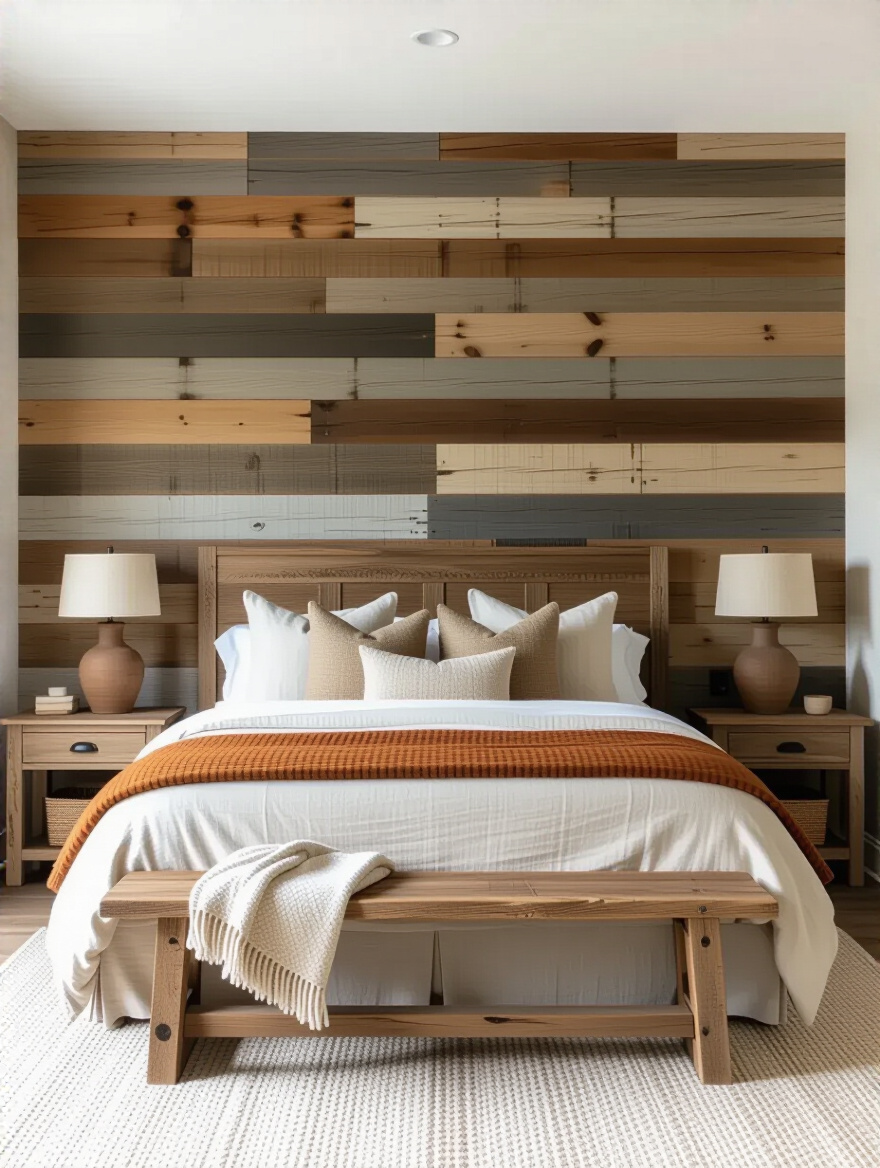
But here is the shortcut I wish someone had told me years ago: not all old wood is good wood. You must make sure it is properly kiln-dried and treated. The romance of an old barn beam ends quickly if it brings insects or moisture problems into your home. Ask the supplier about their process. Good reclaimed wood is an investment in character; bad reclaimed wood is just a future headache. Get it right, and it will be the most honest thing in your room.
From the soul of old wood, we move to the color that will hold it. An earthy palette is the canvas upon which everything else will rest.
Can we talk about the idea of an “earthy” palette? It’s not about just picking from a paint chart labeled “Desert Taupe” or “Forest Green.” The real secret is to look out your window. What are the colors of the stone, the winter sky, the moss on a tree, the wet sand on a shore? That is your palette. These are the colors your brain is already wired to find calming.
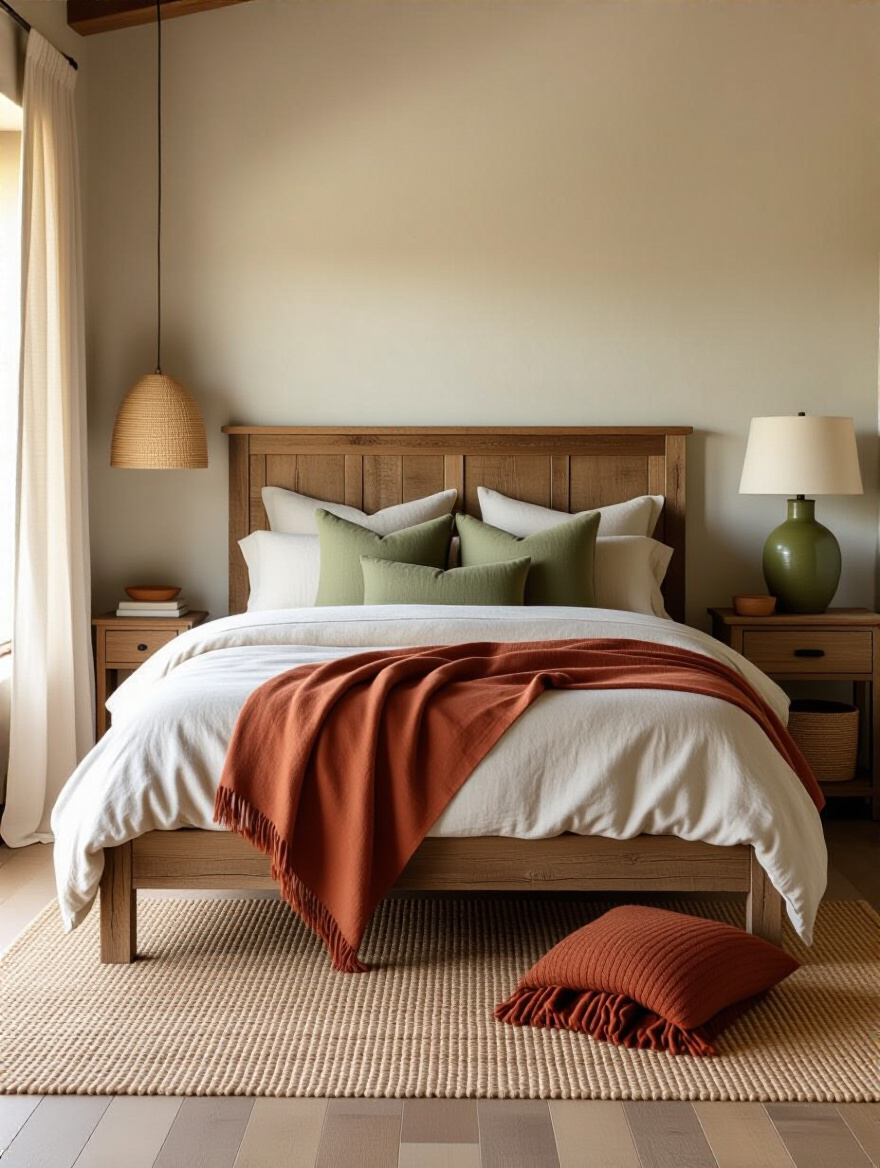
Instead of chasing trends, think about the feeling you want. Warmth? Look to muted terracotta, soft browns, and creamy whites. A sense of calm and air? Look to misty grays, soft blues, and muted sage greens. The mistake people make is choosing too many competing “earth” tones. Pick one main, soft color for the walls—your grounding color. Then, layer in one or two others with your textiles and furniture. Simplicity creates serenity.
This serene canvas now needs texture, something to give it depth. This is where natural stone comes in.
Everyone uses wood, and that is good. But the element that truly makes a rustic space feel grounded is stone. Wood is warm, organic, and yielding. Stone is cool, geological, and permanent. You need both for balance. An accent wall of slate behind a bed or a simple fieldstone hearth for a fireplace doesn’t just add texture; it adds a sense of permanence.
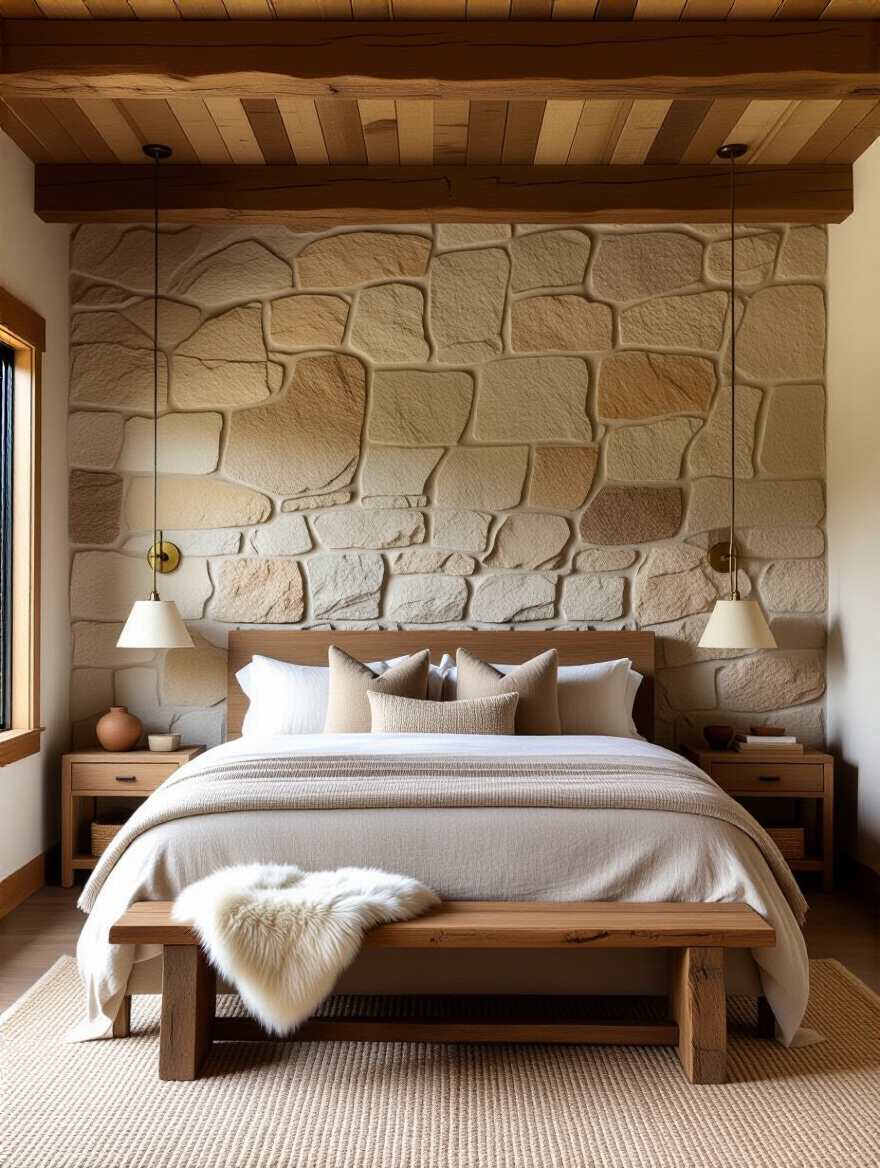
I remember staying in a cabin in western Norway. One wall of the bedroom was exposed rock from the mountainside it was built into. It was cold to the touch, yes. But with a thick wool blanket on the bed and a warm wooden floor underfoot, that coldness made the warmth of the other materials feel even more profound. You don’t need a whole mountain, of course. A few slate tiles as a windowsill or a small stack of river rocks on a shelf can give you that same grounding feeling.
Having established these textures on the walls, let’s bring that character down to the ground beneath our feet.
The term “distressed flooring” makes me sigh. Too often, it means new wood that has been artificially scraped and beaten to look old. That’s missing the point entirely. The goal isn’t to have a floor that looks abused; it’s to have a floor that can live a life without you worrying about every little scratch.
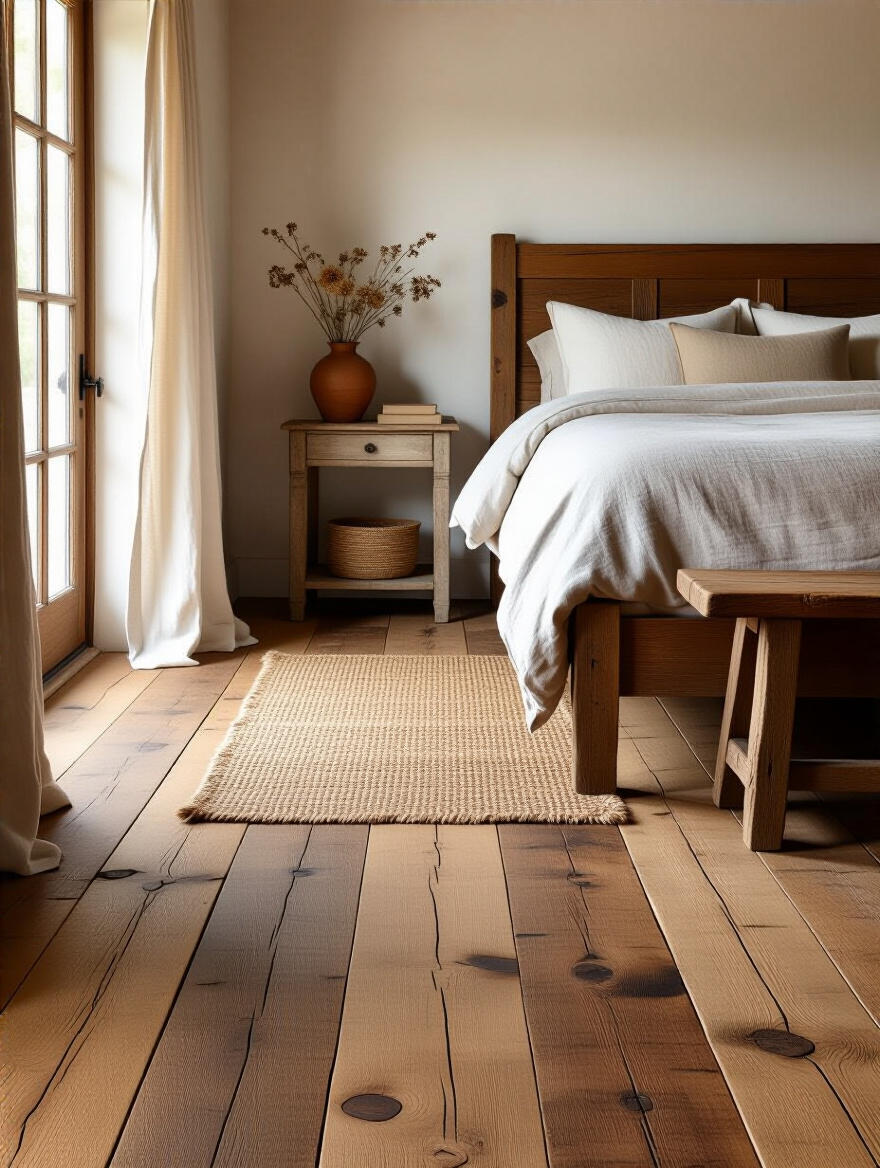
Choose a floor made of a durable, natural material—wide-plank pine, oak, or even a high-quality reclaimed wood. The beauty is not in the fake imperfections from a factory, but in the honest ones that will come over time. The small dent from a dropped book, the slight wear in the path from the door to the bed—these are the marks of life. A floor like this doesn’t get ruined; it just develops more character. It’s a foundation that forgives, and in a home, forgiveness is a beautiful thing.
Upon this honest floor, we must place furniture with the same integrity.
I used to think that furnishing a room meant filling it. Now I know that furnishing a room means choosing a few, very good things. One solid, handcrafted bed frame made of real oak will give you more satisfaction than an entire suite of flimsy, mass-produced furniture that will creak in a year and end up in a landfill in ten.
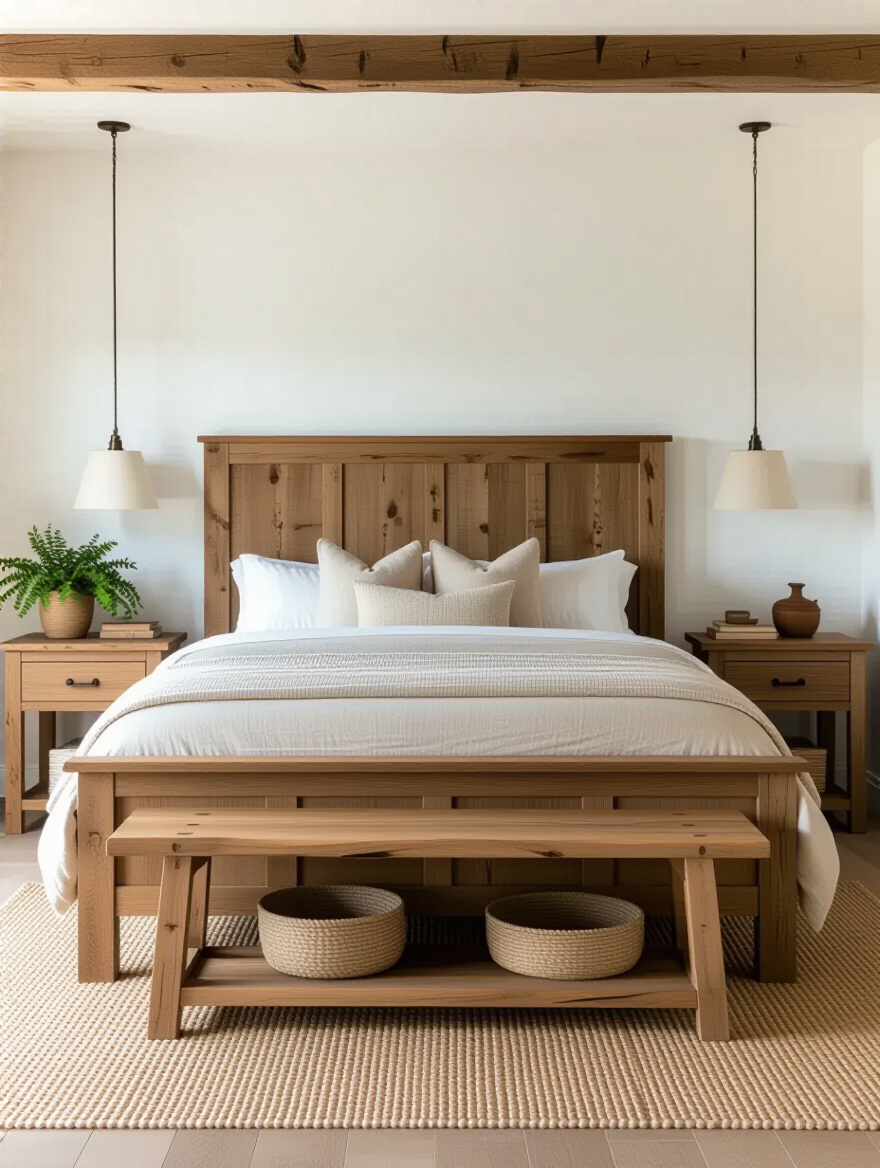
This isn’t about being wealthy; it’s about being wise. Save up for a well-made dresser with dovetail joints. Find a local artisan who can build you simple, sturdy nightstands. These pieces are not just furniture; they are future heirlooms. They have weight, both physically and emotionally. They ground a room. Everyone else says to get the “look for less.” I say, get “quality for more” and buy it once. In the long run, it is the most sustainable and fulfilling choice.
But even a room filled with history needs a connection to the present. Blending in a few modern touches is what keeps the design alive.
Here’s where many people go wrong with rustic design. They commit so fully that their bedroom starts to look like a museum exhibit from the 19th century. A truly beautiful space needs balance. The ruggedness of reclaimed wood and stone looks even more beautiful when contrasted with something clean and modern.
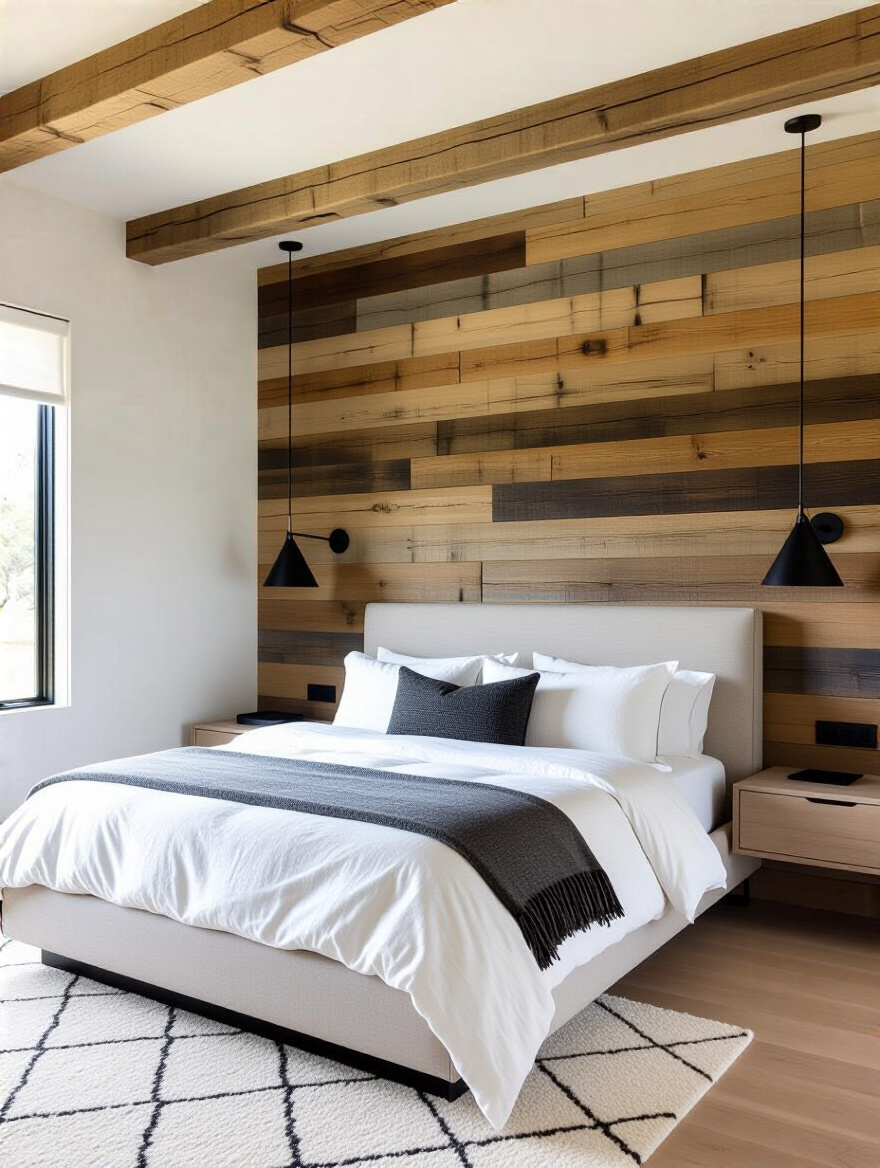
This doesn’t have to be complicated. It could be a simple, modern reading lamp with a clean black finish next to a chunky wooden bed. It could be a bed dressed in simple, solid-colored linen instead of a busy quilt. It could be a sleek, frameless mirror hanging on a rough stone wall. These clean lines give your eyes a place to rest. They provide a moment of quiet, which makes the noisy textures of the rustic elements even more appreciated. This balance is everything.
Now that the room has its bones, we give it a soul. This comes from the layers you add—the things you touch, that touch you. This is how you build comfort. This is how you create hygge.
Your bed is the heart of the room, and what it’s dressed in matters more than you think. Forget about high-thread-count nonsense and synthetics that trap heat. The most luxurious materials are the most natural: linen, organic cotton, wool. They breathe. They regulate your temperature. They get softer and more beautiful with every wash.
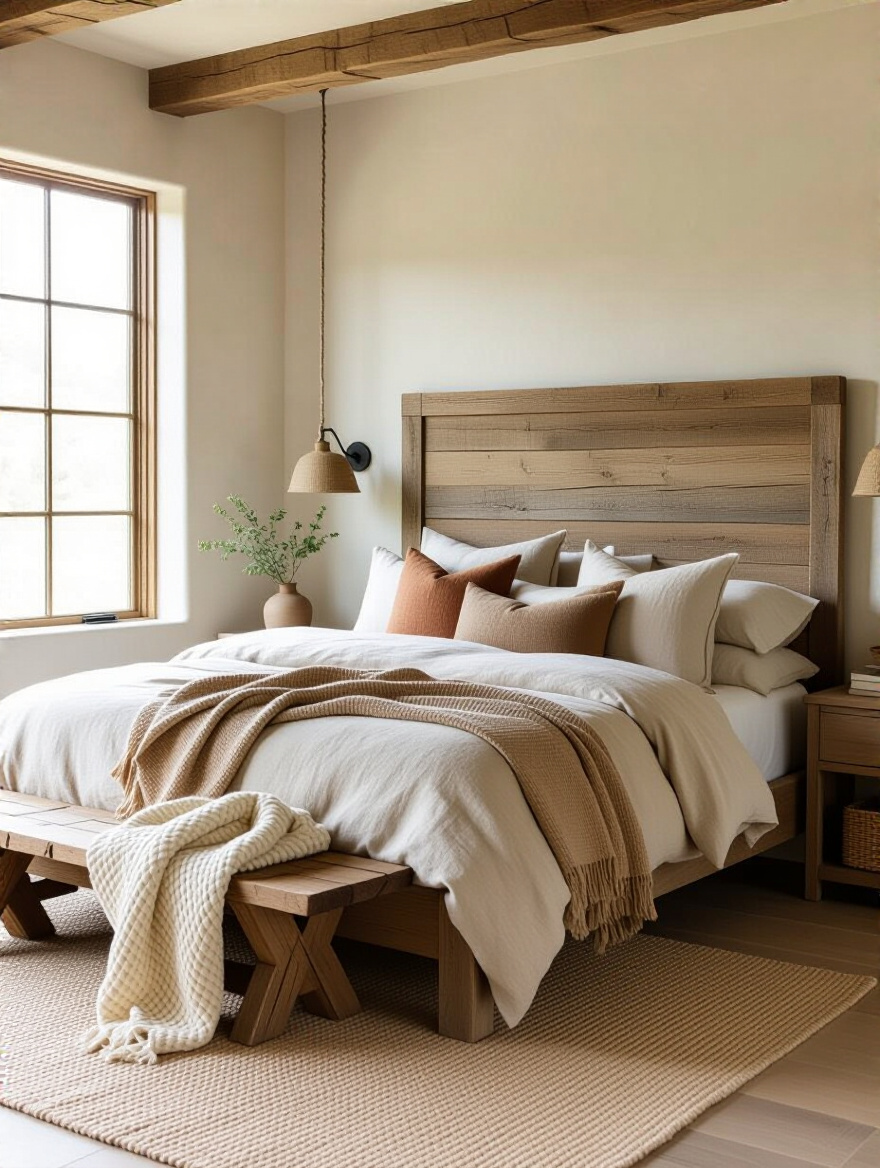
The real secret is in the layering. A smooth cotton sheet, a light wool blanket, and a textured linen duvet on top. Don’t worry if the linen is a little wrinkled—those wrinkles are a sign of its character, of a relaxed and comfortable life. I learned this the hard way, spending years trying to iron everything perfectly. It was a revelation to just let the fabric be itself. It’s a more honest way to live.
On top of these base layers, you need that final invitation to sink in and get comfortable. A plush throw is a perfect signal.
A single throw blanket, draped over the corner of the bed or an armchair, is an invitation. It says, “Come here. Slow down. Be warm.” It’s a simple gesture that has a profound impact on how a room feels. A real, heavy wool throw is an investment you will have forever, but a high-quality faux fur can give you that same sense of primal comfort.
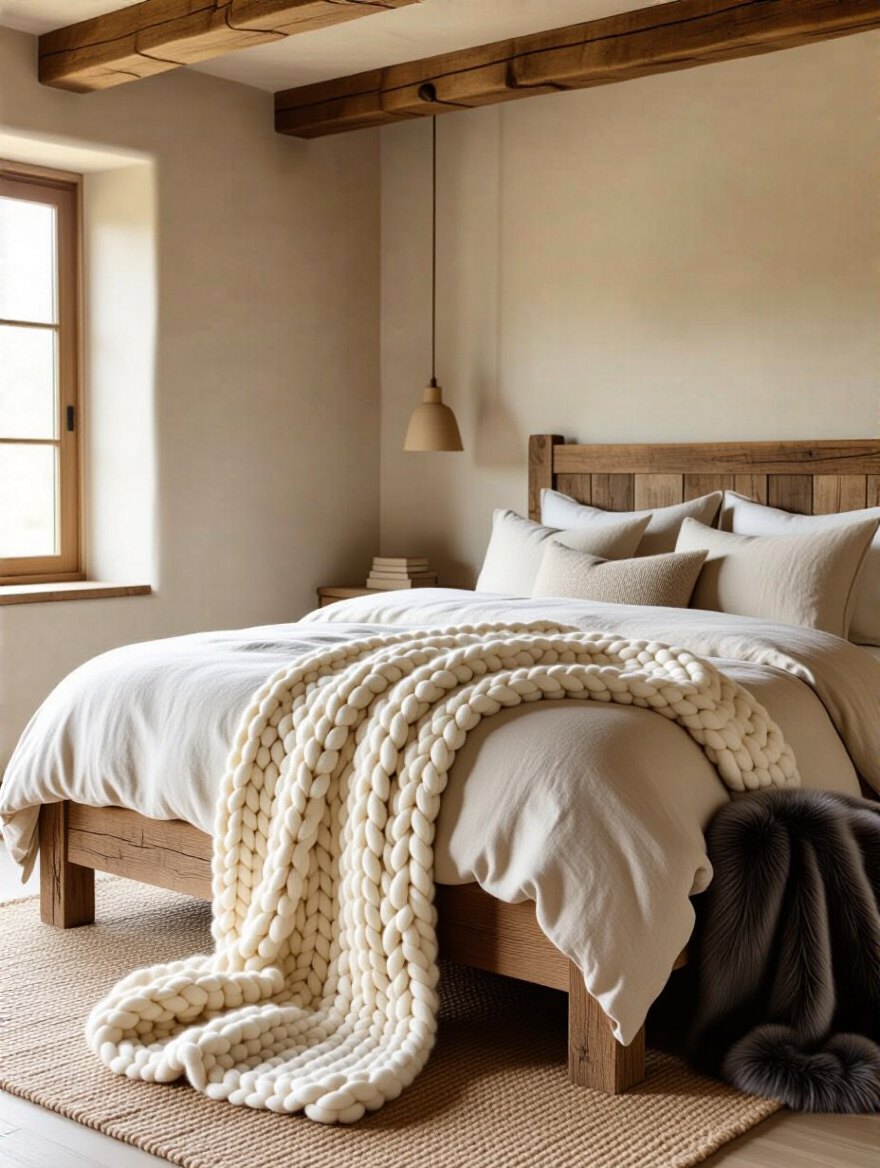
The key is texture. In a room with the hard surfaces of wood and stone, you need these moments of extreme softness to create balance. This isn’t just for decoration; it’s a functional tool for comfort. When you feel a chill, you reach for it. When you want to read, you wrap it around yourself. It makes the room not just a space to look at, but a space to be truly lived in.
From the softness of the bed, we look to the floor, where a natural rug will anchor the entire space.
Your beautiful wood floors need something to anchor the bed and provide texture underfoot, especially on a cold morning. A jute or sisal rug is perfect for this. People sometimes worry they are too rough, but that’s the wrong way to think about it. Their rugged, natural texture is what connects the room back to the earth. They feel honest.
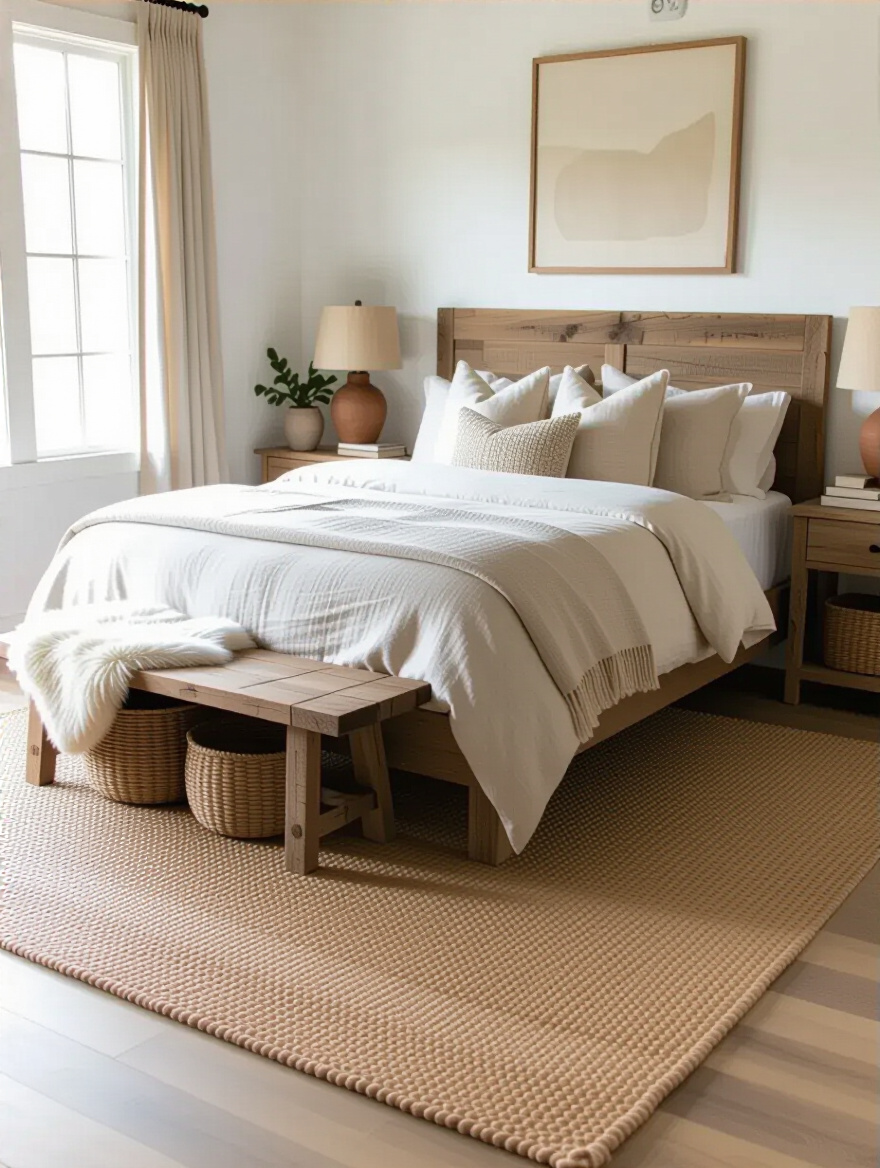
Here’s the shortcut to making them feel soft: layering. Place a large jute or sisal rug under the bed, so it extends generously on all sides. Then, place a smaller, softer rug—like a small sheepskin or a simple wool runner—right where your feet land when you get out of bed. You get the rugged, grounding aesthetic of the large rug and the soft, warm touch you need in that first moment of the day.
With the floor grounded, our eyes move to the windows and how they frame the world outside.
Windows are not just holes in the wall; they are sources of light, air, and connection to the outside world. The last thing you want to do is suffocate them with heavy, complicated drapes. In a rustic space, the window dressings should be simple, honest, and functional. Linen or even simple burlap panels are perfect.
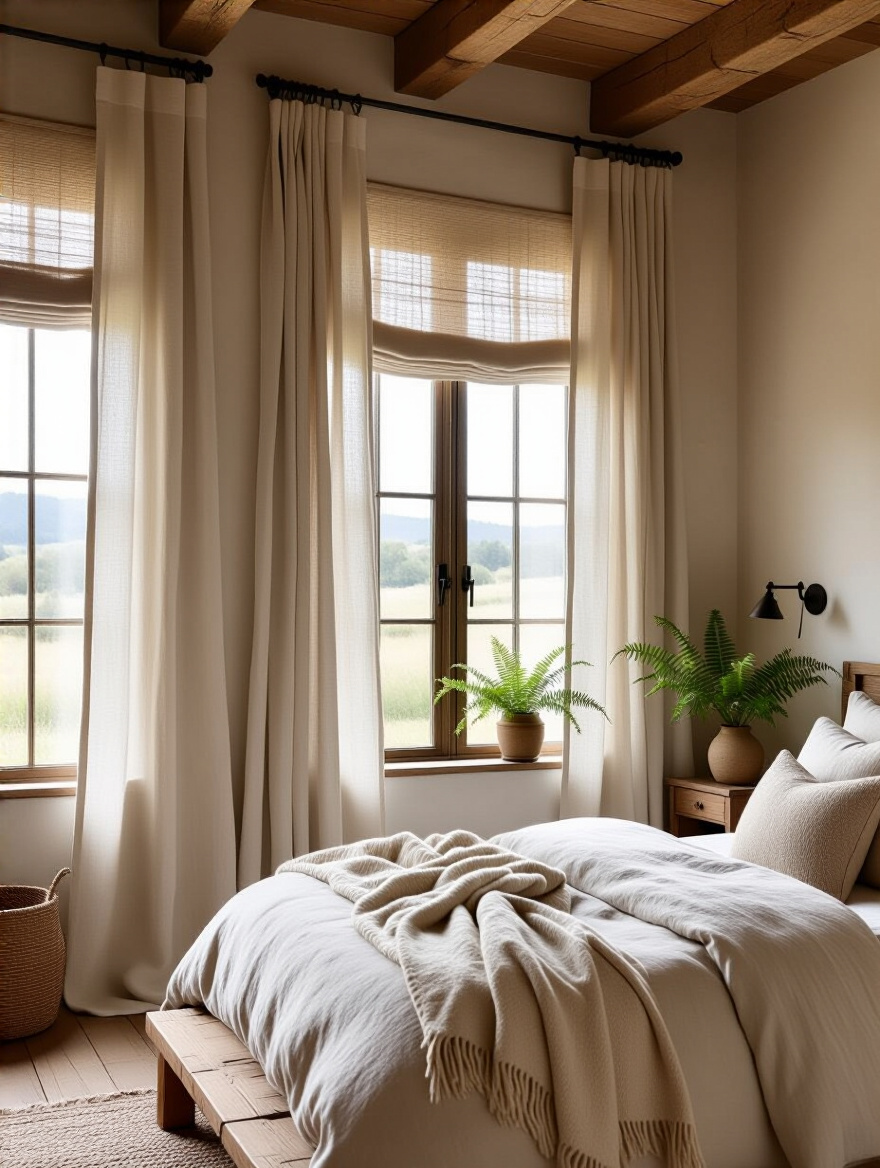
They don’t need to block all the light. In fact, their beauty is in how they filter the light, turning harsh sun into a soft, diffused glow that fills the room. Hang them from a simple iron or wood rod. Let them be a little imperfect. This isn’t about formal decoration; it’s about softening the edges of your room and creating a gentle atmosphere. It’s about working with nature, not trying to shut it out.
Now, let’s address the practical need for storage in a way that enhances, rather than detracts from, the rustic feel.
Clutter is the enemy of serenity. But the solution isn’t more plastic bins. It’s beautiful, functional, and natural storage. Woven baskets—made of seagrass, rattan, or jute—are the perfect answer. They are an honest way to store the things of everyday life. A large one in the corner for extra blankets, a medium one on a shelf for books, a small one on the nightstand for chargers and glasses.
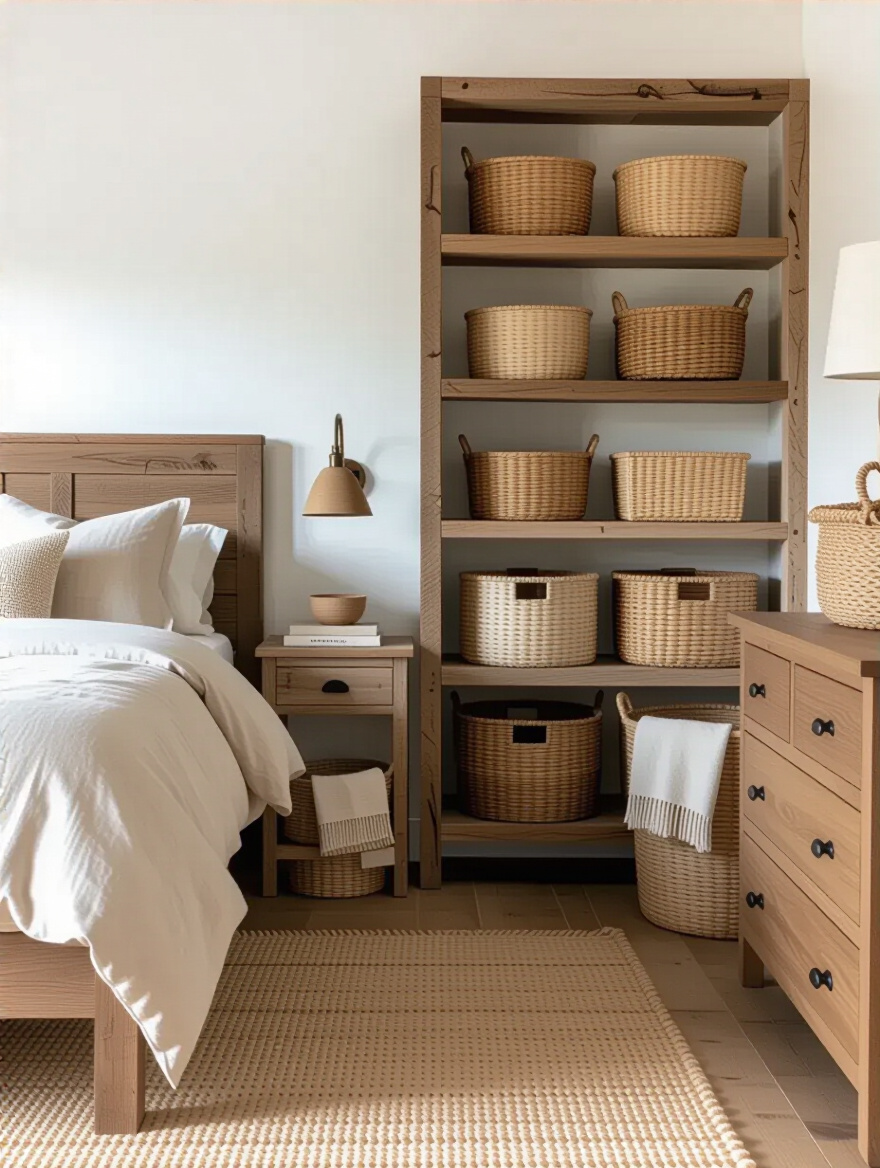
I once worked with a client whose bedroom was lovely, but their laundry was always piled in a plastic hamper in the corner, a jarring note in a calm space. We replaced it with a tall, handsome wicker basket with a lid. It cost very little, but the entire feeling of the room changed. The clutter was still there, but it now had a quiet, dignified home. This is the essence of functional beauty.
To complete our textile story, let’s focus on the final small touches that make the bed truly inviting.
Forget the perfectly-chopped, showroom-style accent pillows that you’re afraid to lean on. In a rustic bedroom, pillows are for comfort first. Choose pillows made of tactile, natural fabrics like chunky knits, flannel, or washed linen. Simple patterns like a classic plaid or a subtle stripe work much better than anything too loud or complicated.
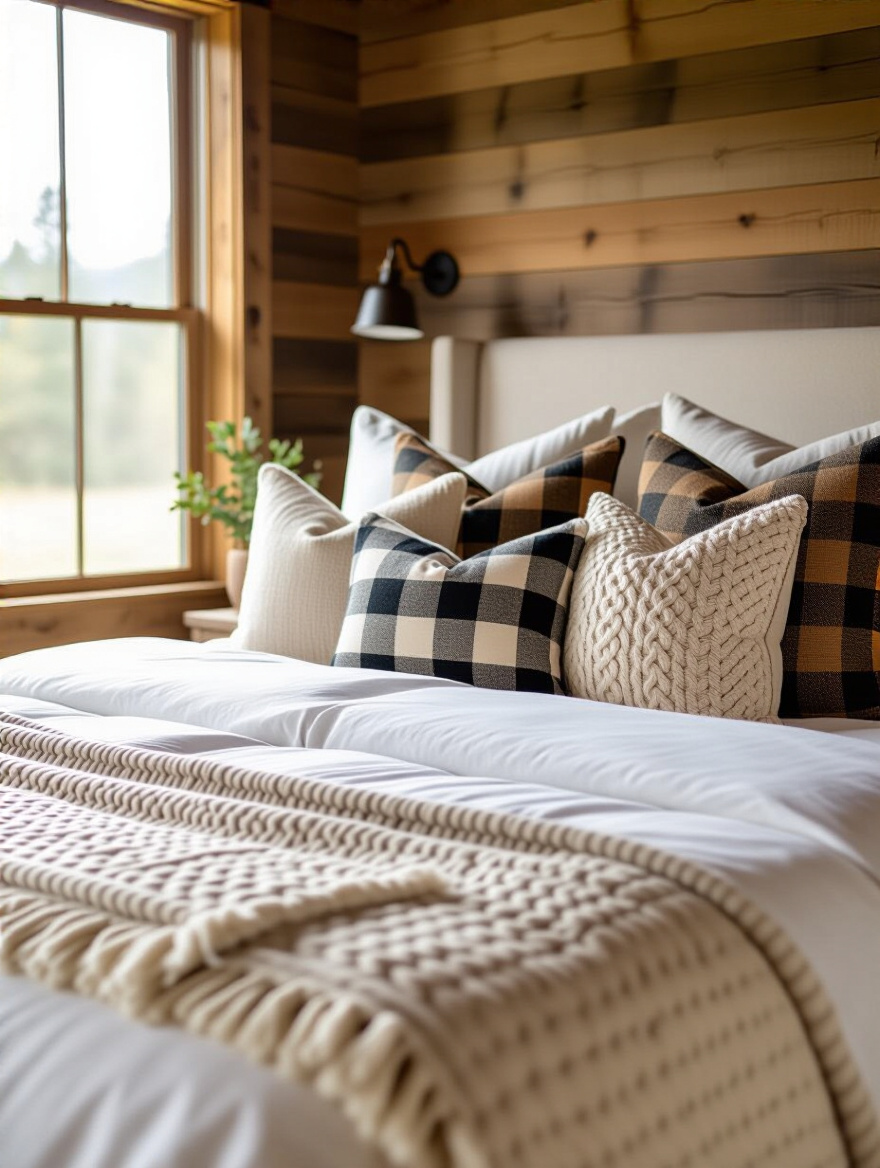
And here’s a detail I love: pillows with a raw, frayed edge. It’s a small thing, but it speaks to that wabi-sabi idea of finding beauty in imperfection. It looks handmade, unpretentious, and real. Mix a few different sizes and textures together on the bed for a layered, inviting look that says, “Please, come and rest here.” It’s an invitation, not a “do not touch” display.
Light is perhaps the most important element in creating a mood, especially in a rustic space. We are not just illuminating a room; we are creating warmth, shadow, and a sense of magic. Metals, too, play a role here, providing a solid counterpoint to the soft glow.
Edison bulbs became very trendy, and like many trends, people started using them without thinking. The point isn’t the fancy filament you can see. The point is the color of the light. The warm, amber glow (around 2200-2700 Kelvin) is what creates that cozy, candle-lit feeling. It’s a light that encourages you to relax and unwind.
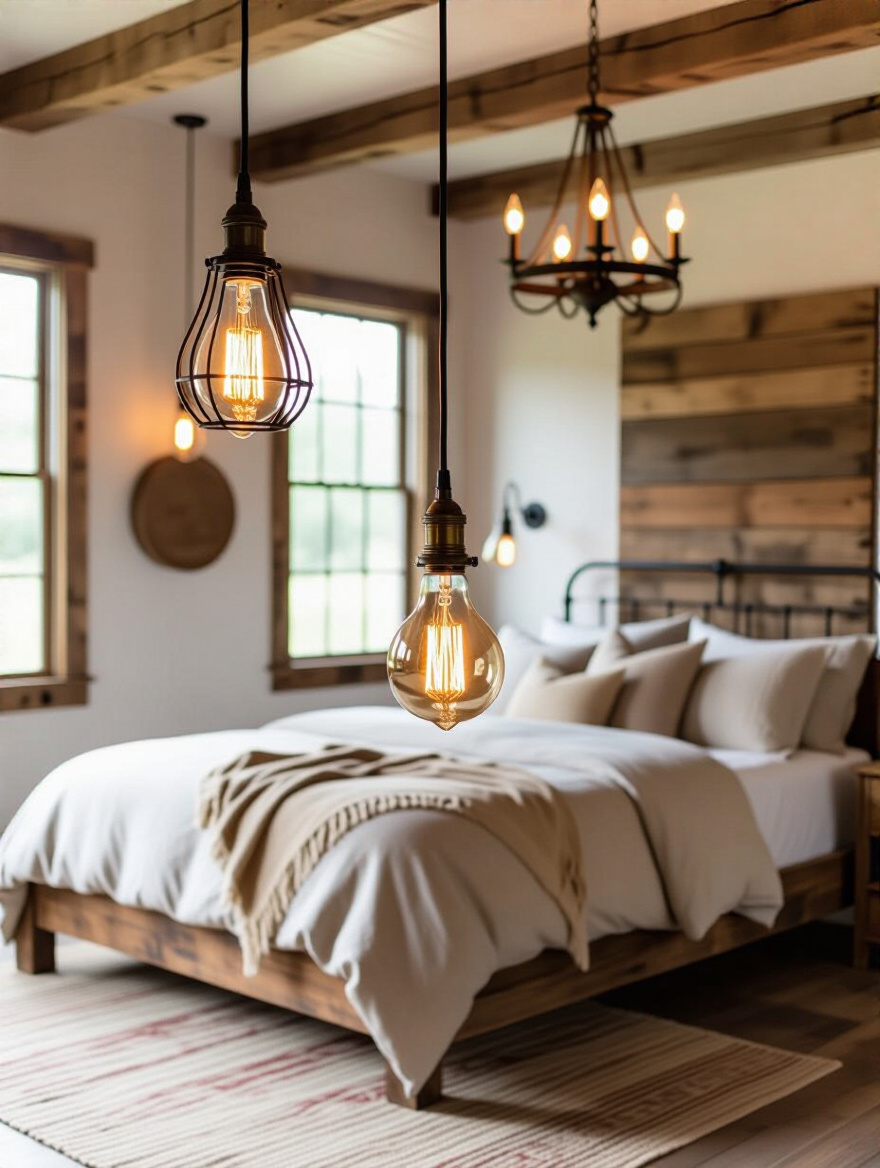
Here’s the only rule that matters: always, always install them on a dimmer switch. An Edison bulb at full brightness can be harsh. But when you dim it down to a soft glow, it’s magic. And use the modern LED versions. You get the same warm look without the high energy bill or the heat. They are a perfect blend of vintage soul and modern sensibility.
This warm glow shouldn’t come from just one place. It needs to be layered throughout the room.
Please, I am begging you, do not rely on a single, harsh overhead light. It is the fastest way to kill the soul of a room. A well-lit bedroom should have multiple “pools” of soft light. This is what interior designers mean when they say “layered lighting,” and it’s simpler than it sounds.
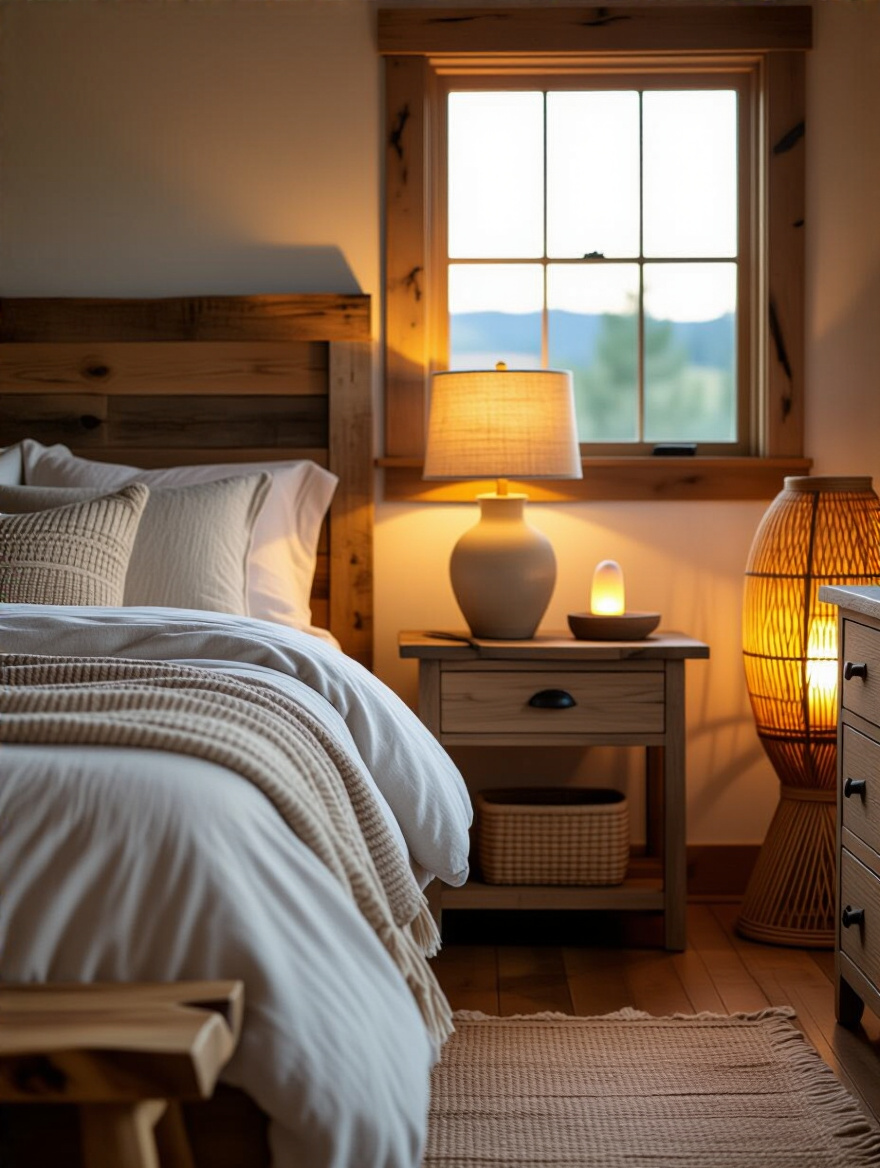
Put a lamp on each bedside table. Add a floor lamp next to a reading chair. Maybe even a small, low-wattage lamp on a dresser. Use warm bulbs in all of them. In the evening, you turn on only the lamps you need, creating a soft, warm glow that makes the room feel intimate and safe. It turns your bedroom from a functional box into a true sanctuary for the night.
To enhance this layered glow, we can add a touch of pure magic.
Some people think fairy lights are just for students or for the holidays, but they are wrong. A strand of tiny, warm-white fairy lights is one of the easiest and most effective ways to add a layer of soft, magical ambiance to a room. They don’t provide enough light to read by, and that is their strength. Their purpose is purely mood.
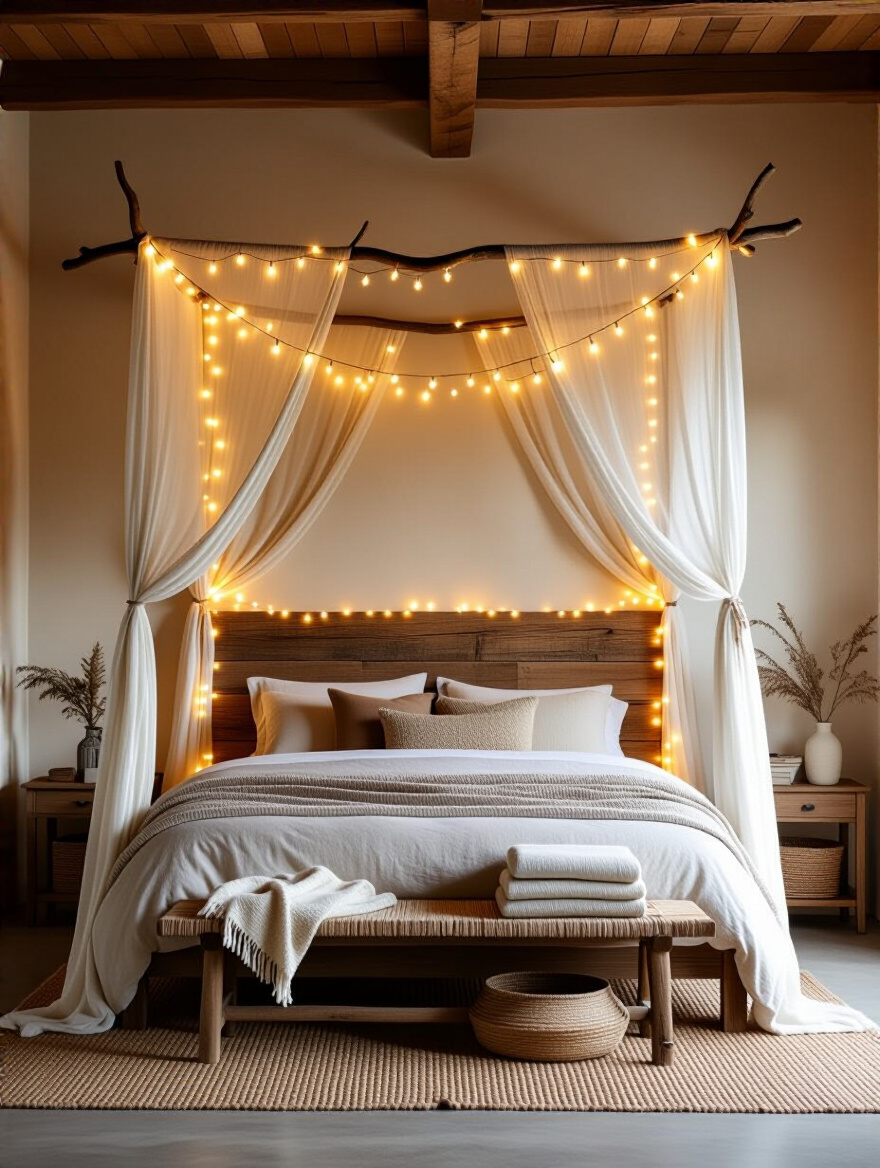
Drape them along a headboard, wrap them around a salvaged branch, or tuck them inside a glass lantern. They create a gentle, non-directional shimmer that feels calming and whimsical. I confess, I even have a small strand woven into a large plant in my own home. It brings me a little bit of joy every evening when they turn on. Sometimes, a little magic is all you need.
With the light established, we need to add the grounding weight of metal accents.
Just as stone provides a cool counterpoint to warm wood, metal provides a hard, industrial edge that makes all the soft textiles feel even softer. A simple, sturdy wrought iron bed frame is a classic for a reason. It is honest, strong, and will last forever.
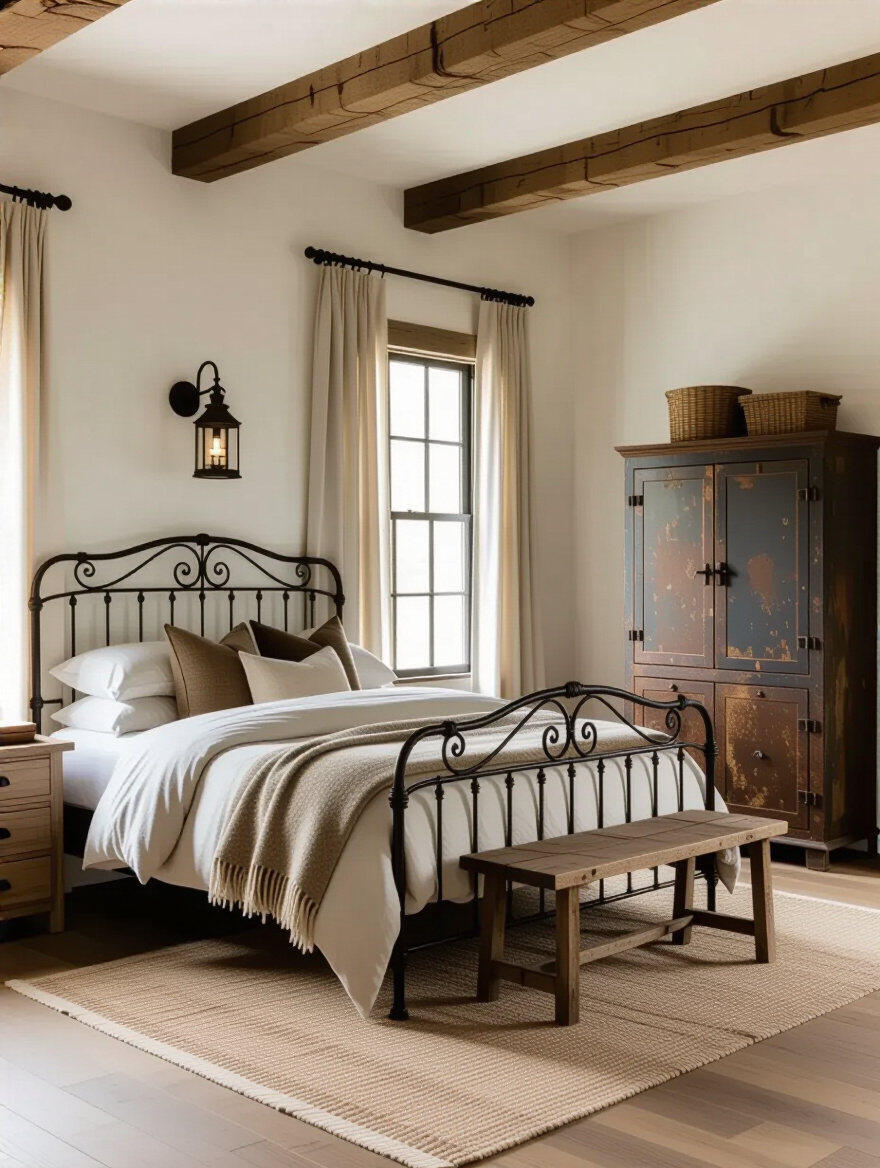
Look for it in the details, too. Wrought iron curtain rods, simple black metal drawer pulls, or a vintage lantern with a distressed metal finish. These pieces add a layer of history and visual weight. Don’t go overboard—a few well-chosen pieces are all you need to ground the space and keep it from feeling too soft or flimsy. They are the punctuation in your design sentence.
Building on that idea of lanterns, let’s talk about the most primal source of light we have.
There is something deep in our human DNA that responds to flickering firelight. It is a primal signal of safety, warmth, and community. Bringing that into your bedroom is a powerful way to create a sense of calm. You can use real candles, of course, but you must be incredibly careful.
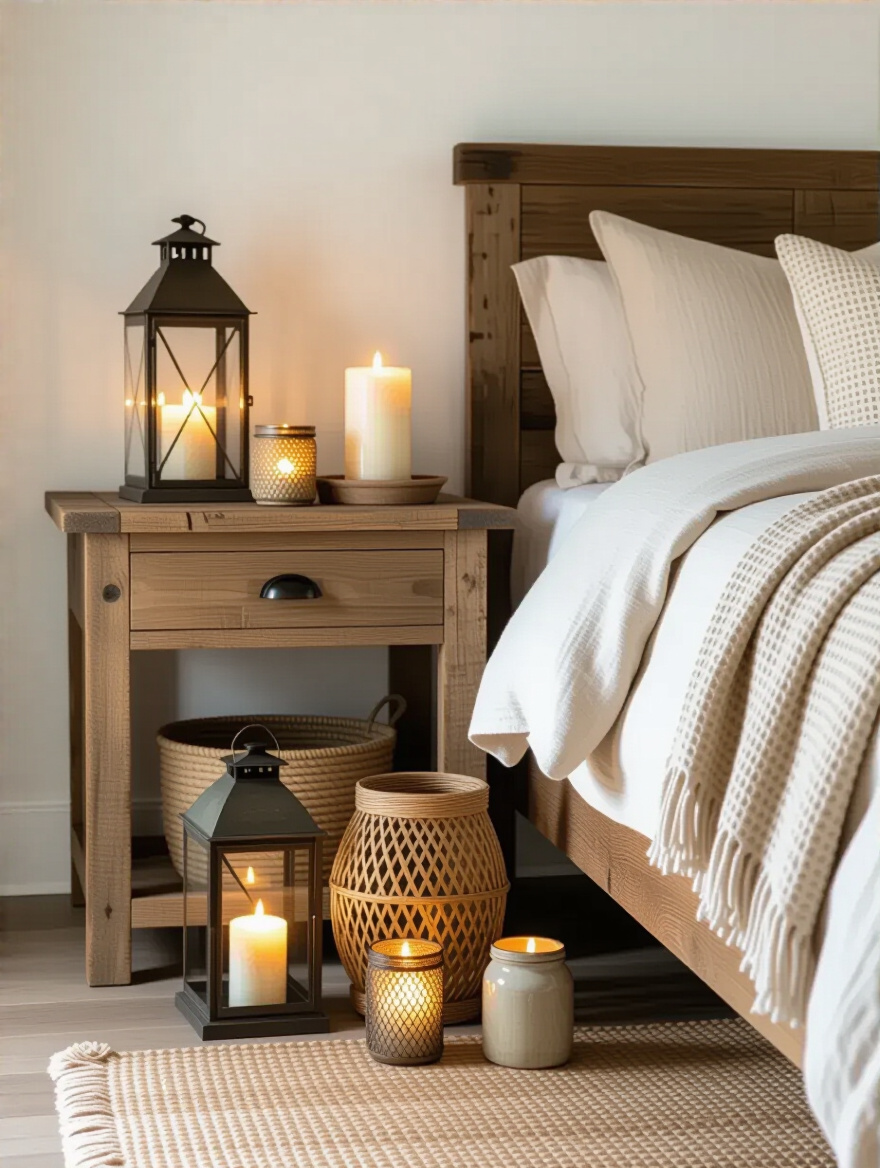
What I often recommend, and use myself, are high-quality flameless LED candles. The technology is so good now that the flicker is incredibly realistic. Group a few of different sizes on a tray on your dresser, or place a large one inside a rustic lantern on the floor. The dynamic, moving light creates a living ambiance that a static bulb can never replicate. It is the final, essential layer of a truly comfortable room.
The foundation is built, the layers are in place. Now is the time to make the space truly yours. This is where you add your story, your personality. This is what transforms a well-designed room into a beloved home.
The art on your walls should be a window to a place that calms you. In a rustic bedroom, this almost always means something from nature. It doesn’t have to be a grand, expensive painting. It could be a simple photograph you took of a forest floor, a watercolor of a moody sea, or a series of pressed botanical prints.
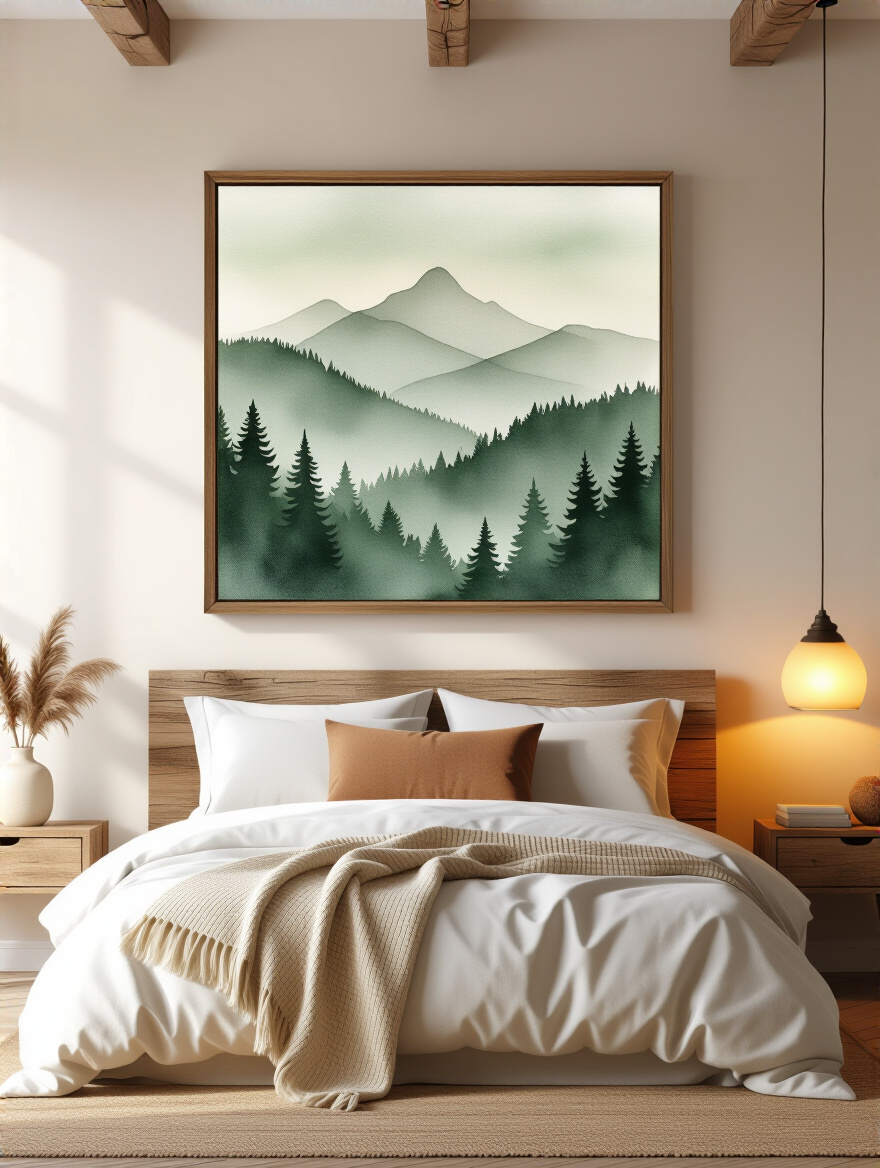
And the frame is just as important as the art itself. A simple, raw wood or barnwood frame continues the story of the room. A client of mine framed a beautiful, large-scale photo of a misty fjord in a slim, modern black metal frame. The contrast was perfect—the wildness of nature contained by the clean line of modernity. Your art should be a source of peace, not a distraction.
We can take this connection to nature one step further by bringing the real thing inside.
A room is not truly alive until there is something living in it. Plants are the most direct way to bring the freshness and vitality of the outdoors into your personal sanctuary. They clean the air, add a vibrant touch of green, and give you something to care for.
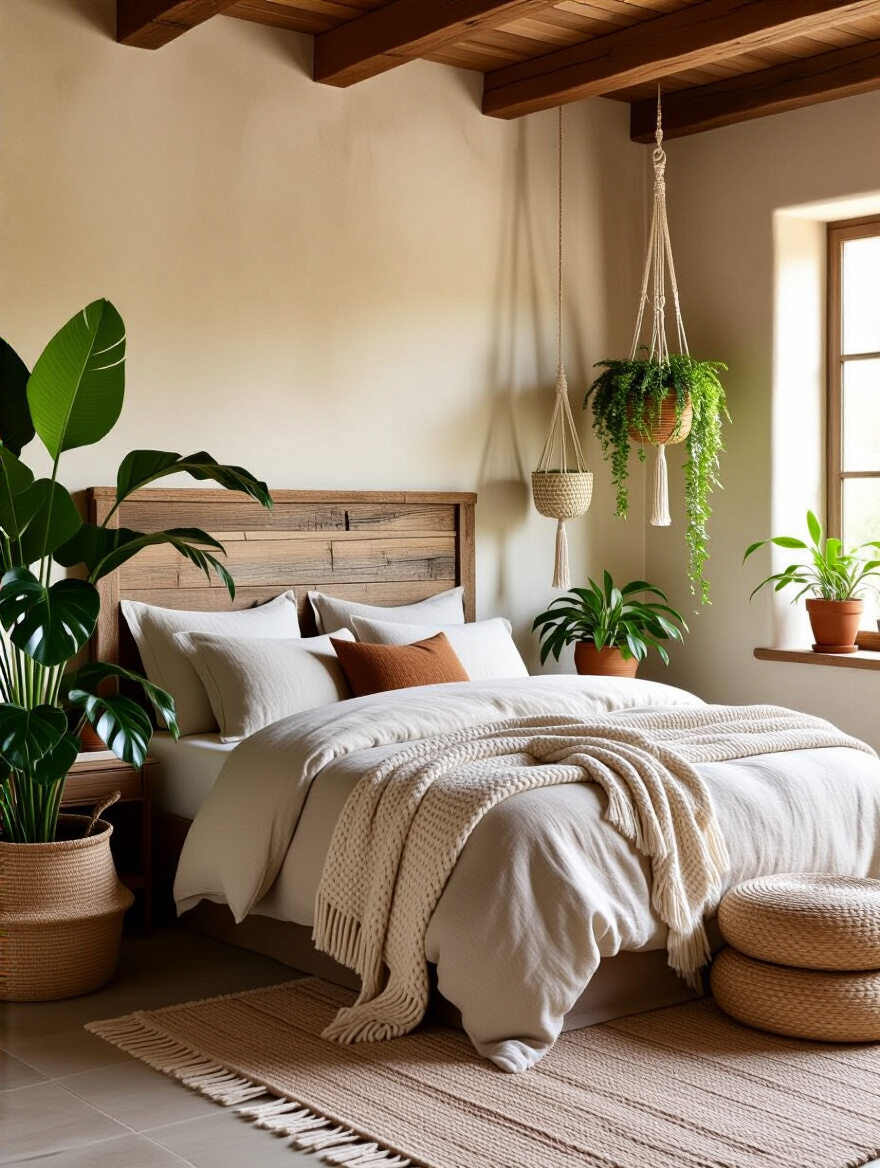
You don’t need to create an indoor jungle. A single, beautiful snake plant in a terracotta pot or a trailing pothos on a high shelf is enough. Choose plants that are forgiving and suited to the light in your room. The act of watering them, of watching them grow, is a small, grounding ritual that connects you to the natural cycles of life. They are a quiet reminder that even indoors, we are part of the living world.
To complement the living, let’s add the story of things that have already lived a long life.
Please, step away from the big-box stores. The soul of a rustic room is found in the things that have a past. A small, weathered stool used as a bedside table, a set of old ceramic pitchers for holding plants, a stack of vintage leather-bound books on a shelf—these are the pieces that give a room its unique character.
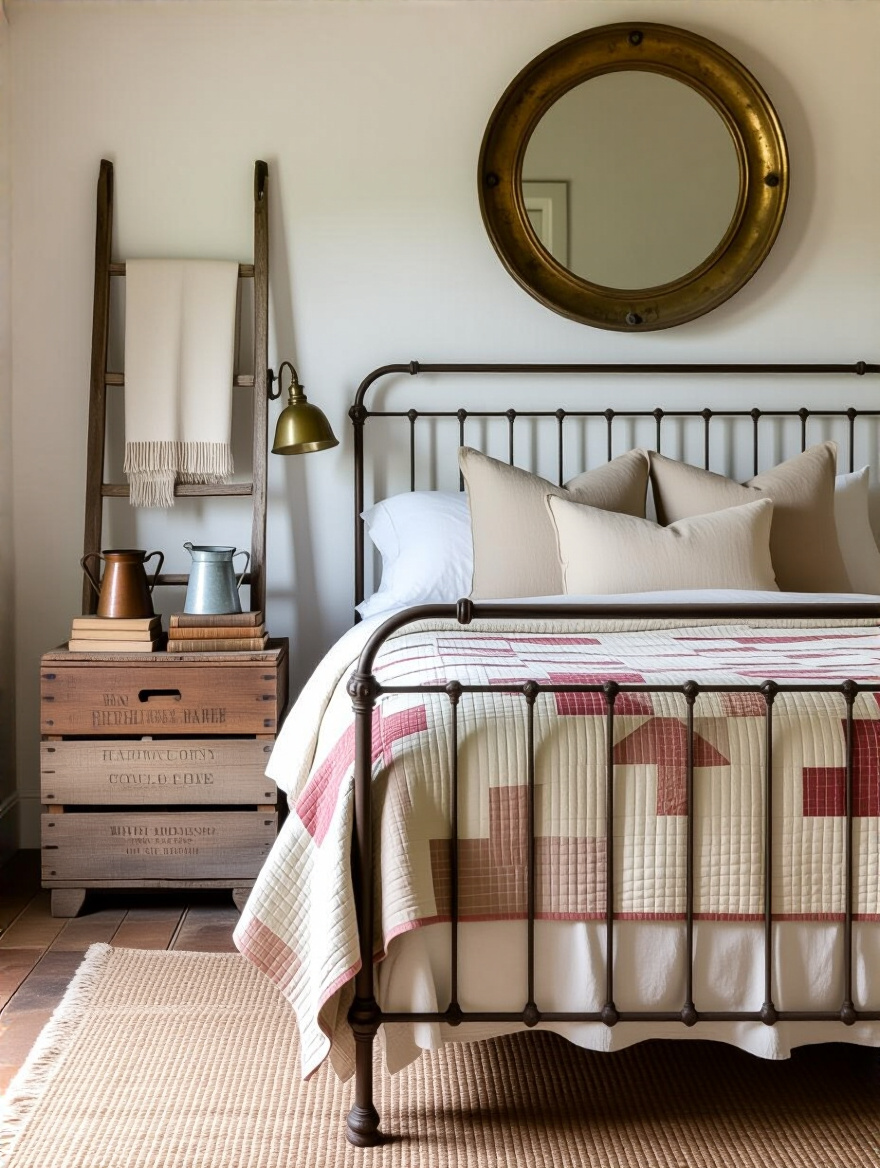
Visiting flea markets, antique shops, or even your grandparents’ attic is a treasure hunt. Look for items with good bones and honest wear. Don’t worry about small imperfections; they are part of the story. I once found an old wooden crate for a few dollars, cleaned it up, and put it at the foot of my bed to hold blankets. It is one of my favorite things in the room because it’s unique, it was cheap, and it’s perfectly functional. One-of-a-kind finds are what make your home yours and no one else’s.
For practical storage that also adds character, there is nothing better than reclaimed wood shelves.
In any bedroom, storage is a challenge. Using your vertical wall space is the smartest solution, and reclaimed wood shelves are the most beautiful way to do it. They are practical, yes, but they also become a design element in their own right, adding warmth and history to your walls.
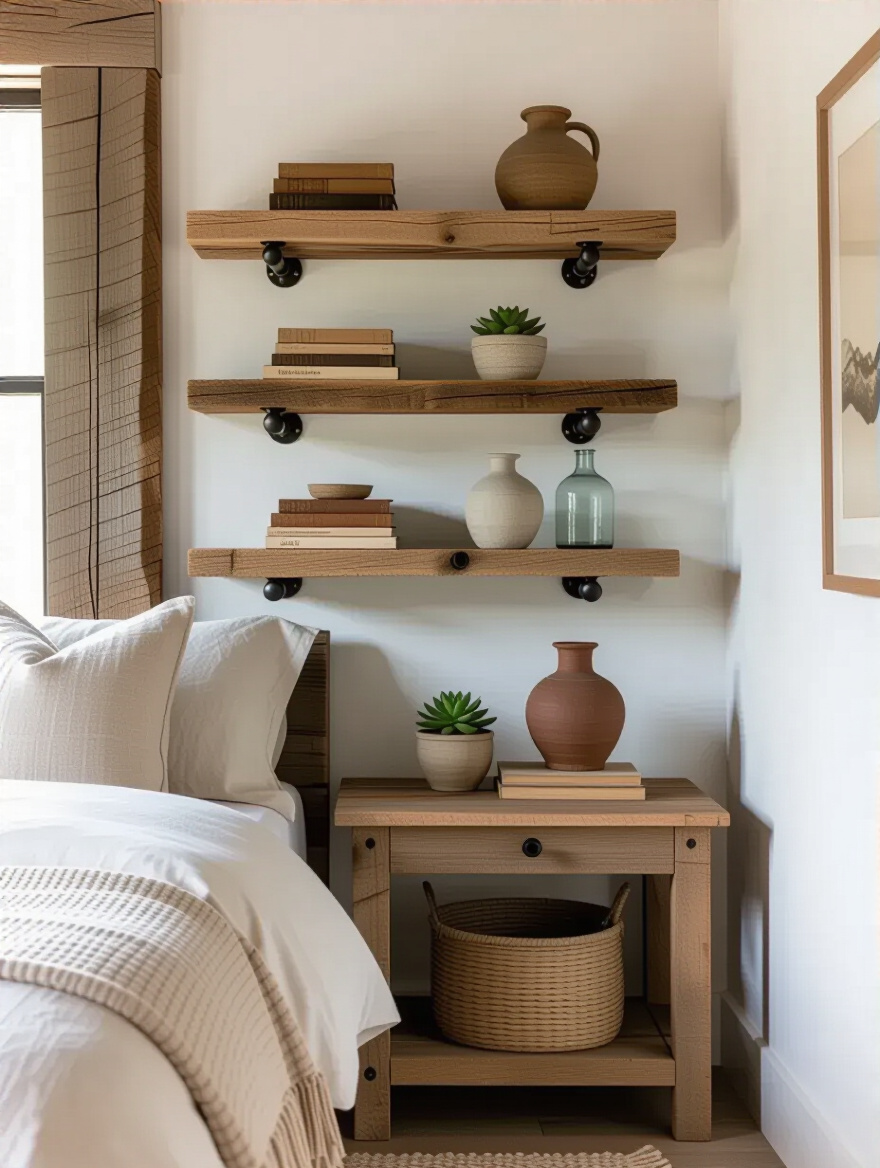
Use them to hold books, a few cherished objects, or a small plant. The key is to mount them with sturdy, simple hardware. Black iron brackets or industrial-style pipe fittings work beautifully. This combination of aged wood and hard metal is the very essence of the balanced rustic look. It is storage that doesn’t feel like storage; it feels like a curated display.
And for our final touch, let’s create a focal point that is deeply personal and beautifully rustic.
A gallery wall is a way to tell your personal story on your wall. But instead of a random jumble of frames, create a cohesive look by using frames all made from reclaimed barnwood. The varied textures and tones of the wood will tie everything together, even if the photos and art inside are very different.
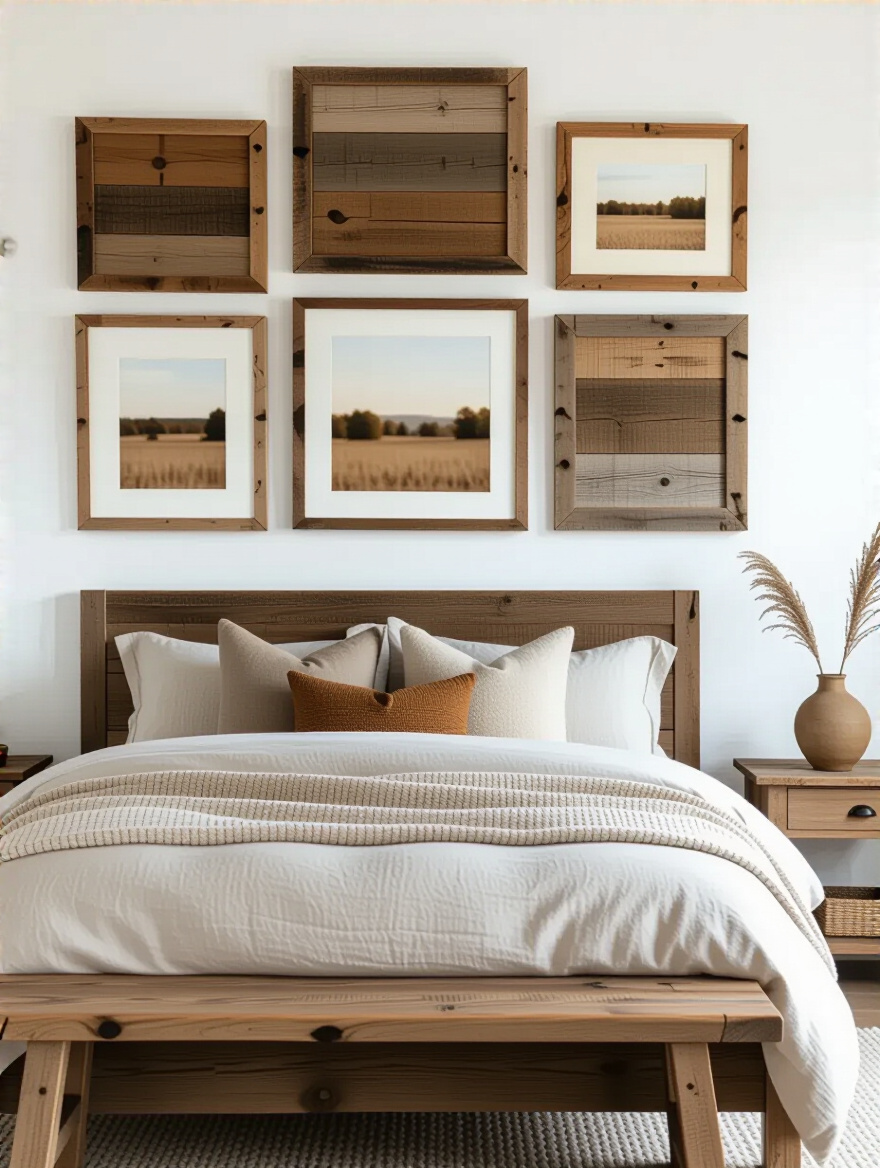
Lay all the frames out on the floor first to get the arrangement right. Mix different sizes and orientations. And don’t just include photos. Mix in a small mirror, a pressed leaf, or a page from a favorite book. This wall becomes the heart of the room, a focal point that is a rich tapestry of your life, framed by the history of the wood itself. It is the perfect marriage of the personal and the rustic.
So you see, creating a rustic bedroom is not about following a checklist of items. It is a philosophy. It is about slowing down and choosing things with intention. It’s about celebrating the beauty of natural materials, the comfort of soft layers, the peace of warm light, and the stories held within old things.
It is about building a room that feels like a deep, calming breath at the end of a long day. A room that is not just beautiful to look at, but restorative to be in. So take these ideas, but make them your own. Start with one thing—a new set of linen sheets, a single vintage find, a beautiful plant. And slowly, thoughtfully, build the sanctuary you deserve.